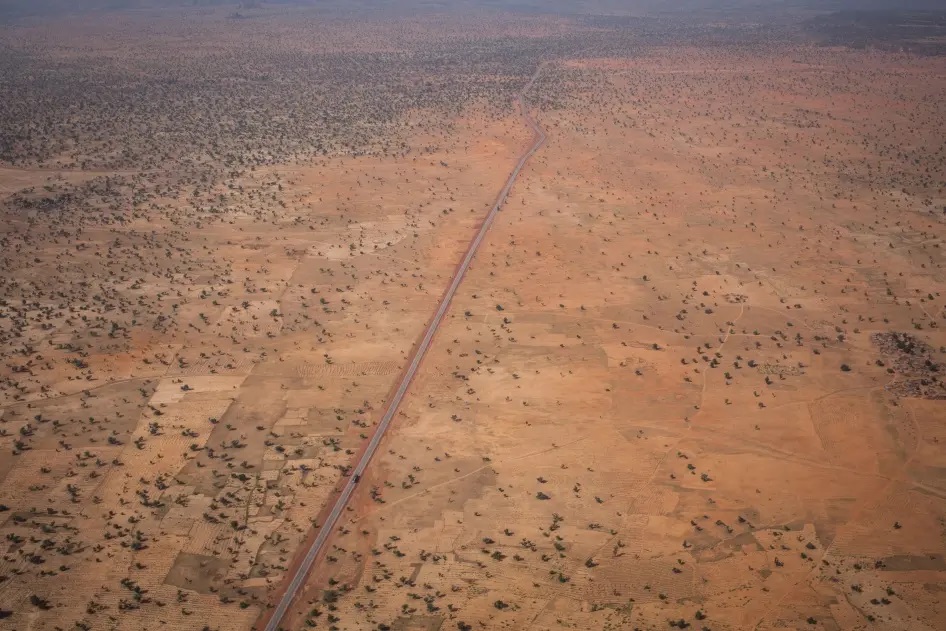Provide Accountability, Improve Protection for Civilians
Nairobi- An Al-Qaeda-linked Islamist armed group killed at least 32 civilians, including 3 children, and set fire to over 350 homes in central Mali in January 2024, forcing about 2,000 villagers to flee, Human Rights Watch said on Wednesday, May 8, 2024.
Earlier in January, an ethnic militia killed at least 13 civilians, including 2 children, abducted 24 other civilians, and looted property and livestock in central Mali. These attacks violate international humanitarian law and are apparent war crimes.
Human Rights Watch documented two attacks by the Group for the Support of Islam and Muslims (Jama’at Nusrat al-Islam wa al-Muslimeen, JNIM) on the villages of Ogota and Ouémbé, Mopti region, on January 27, and two attacks by Dozo militia on the villages of Kalala and Boura, Segou region, in early January. These attacks occurred amid recurrent tit-for-tat killings and communal violence in central Mali. Mali’s transitional military authorities, which took power in a May 2021 coup, should urgently investigate the abuses, fairly prosecute those responsible, and provide better protection for all civilians at risk.
“Islamist armed groups and ethnic militias are brutally attacking civilians without fear of prosecution,” said Ilaria Allegrozzi, senior Sahel researcher at Human Rights Watch. “The authorities need to act to end the deadly cycles of violence and revenge killings and better protect threatened civilians.”
Between February and April, Human Rights Watch interviewed 25 people by telephone with knowledge of the attacks, including 15 witnesses, 3 Malian activists, and 7 international organization representatives. Human Rights Watch also analyzed satellite imagery of burned homes in Ogota and Ouémbé.
Mali has been fighting Islamist armed groups linked to Al-Qaeda and the extremist armed group Islamic State (also known as ISIS) since 2015. In December 2023, the United Nations Multidimensional Integrated Stabilization Mission in Mali (MINUSMA), pulled out of the country at the request of Mali’s transitional military authorities, raising concerns about protecting civilians and monitoring abuses. In January, the transitional authorities announced that Mali would leave the Economic Community of West African States (ECOWAS), depriving abuse victims of the ability to seek justice through the ECOWAS Community Court of Justice.
Witnesses said that on January 27 the JNIM attacked Ogota, populated mainly by ethnic Dogon, as retaliation for the presence of Dan Na Ambassagou militia in the vicinity. “They invaded the village, shooting at anything and anyone for more than an hour,” said a 40-year-old woman. “They set the whole village on fire.”
On January 6, Dozo militia attacked Kalala, a predominantly ethnic-Fulani village, and killed 13 civilians. “We found six bodies in front of the mosque, and the others inside homes or outside,” said a herder. “The Dozo targeted us because we are Fulani, and they think all Fulani are terrorists.” Witnesses from Kalala said the attack was retaliation for JNIM’s attacks against ethnic Bambara in surrounding villages in October and November.
Malian transitional military authorities have not adequately investigated incidents implicating members of Islamist armed groups or ethnic militias, Human Rights Watch said. In his February report, Alioune Tine, the UN Independent Expert on the situation of human rights in Mali, stated that he regrets “that no significant progress has been made in prosecuting the alleged perpetrators of multiple violations and abuses of human rights and violations of international humanitarian law attributed to violent extremist groups, militias and community self-defence groups and Malian forces.”
Witnesses to the JNIM attacks said that the Malian security forces failed to adequately protect their communities. “The Malian state has abandoned us,” said a 34-year-old man from Bankass, Mopti region. “Since 2018, the jihadists have imposed Sharia [Islamic law] on us, attacked our villages, mined our roads, [and] kidnapped our children. We have always called for help from our authorities, but there has been no response. These attacks continue because terrorists enjoy freedom of action and are never held accountable.” A witness to the Dozo militia attack in Boura on January 3, however, found the authorities willing to respond promptly, saying that local gendarmes “acted quickly … and arrested three militiamen.”
Human Rights Watch has also documented serious abuses by the Malian security forces and apparent Russia-backed Wagner forces during counterinsurgency operations in central Mali.
Under international humanitarian law, the fighting in Mali is considered a non-international armed conflict. Applicable law includes Common Article 3 to the Geneva Conventions of 1949 and customary laws of war, which apply to non-state armed groups as well as national armed forces. The laws of war prohibit summary executions, torture, attacks on civilians and civilian property, and looting, among other violations. The government has an obligation to impartially investigate and appropriately prosecute those implicated in war crimes, which are serious violations of the laws of war committed with criminal intent.
“The Malian transitional government’s failure to hold Islamist armed groups and ethnic militias to account only emboldens abusive forces to commit further atrocities,” Allegrozzi said. “The authorities should ramp-up efforts to appropriately investigate and prosecute all those responsible for grave abuses.”
For witness accounts and other details, please see below. The names of those interviewed have been withheld for their protection.

